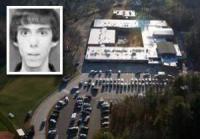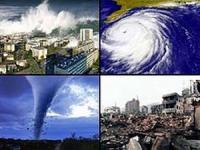-
Police were told of Adam Lanza’s plan to carry out school mass shooting -- 4 years before he did

In 2008, four years before Adam Lanza went on a shooting spree at Sandy Hook Elementary School in Newtown, Connecticut, the local police were told that he planned to carry out a massacre. The local police at the time, and legal experts since, say it is unclear what officials could have done to stop the attack at the point they were alerted to Lanza violent musings. All firearms in the Lanza home had been legally purchased by Nancy Lanza, whom Lanza shot and killed in her bed the morning of 14 December before going to the school and fatally shooting twenty children and six staff members. In response to a FOIA request, the FBI release a batch of heavily redacted documents – 1,500 pages in all – which also show Lanza’s interest in pedophilia, and his obsession with mass shooting.
-
-
Russia blocks extension of UN’s mandate to investigate Assad’s chemical weapons usage
On Tuesday, Russia vetoed a United Nations Security Council resolution to extend the mandate of the institution investigating chemical weapon attacks in Syria. The Joint Investigative Mechanism (JIM), whose mandate expires next month, was established in 2015 to identify the perpetrators of chemical attacks. A decision on its renewal must be made by 17 November.
-
-
Unprecedented levels of cross-border cooperation among extreme right groups: Report

New research released the other day by ISD, a counter-extremism NGO, reveals increasing collaboration among extreme far-right groups globally. The report shows how extreme right groups have been opportunistically, and effectively, bridging ideologies and adapting their tone to manipulate legitimate social grievances – immigration, freedom of speech, and terrorism – in order to reach and radicalize mainstream parties and movements.
-
-
Acoustic gunshot sensor technology may benefit shooting victims
A number of U.S. cities have installed acoustic gunshot sensor technology to accurately locate shooting scenes and potential gunshot victims, but the effectiveness of this technology for saving lives had not been studied until now. A new study shows that the technology contributes to quicker hospital arrival times and equal survival rates despite more severe injuries.
-
-
Communications system that can withstand natural disasters

In the wake of natural disasters which have brought communication to a standstill, researchers have been leading an international research team to tackle the problems of maintaining communications under hostile conditions. A researcher at Queen’s University Belfast has been shortlisted for the 2017 Newton Prize after he created a robust wireless communications system which can battle through an earthquake, tsunami or hurricane.
-
-
Testing polymer fibers for body armor
High-performance polymer fibers have been used in ballistics applications for more than forty years. Although effective at stopping or slowing down bullets, users have sometimes found these vests, which are worn either under or over clothing, to be heavy and bulky—akin to wearing 15 to 20 shirts at once on a hot summer day. Many would like a more comfortable alternative. NIST scientists have developed a new way to investigate the high-performance fibers used in modern body armor.
-
-
Are many hate crimes really examples of domestic terrorism?
This growing domestic menace deserves more attention than it’s getting. I consider domestic terrorism a more significant threat than the foreign-masterminded variety in part because it is more common in terms of the number of attacks on U.S. soil. The number of violent attacks on U.S. soil inspired by far-right ideology has spiked since the beginning of this century, rising from a yearly average of 70 attacks in the 1990s to a yearly average of more than 300 since 2001. Despite an uptick in far-right violence and the Trump administration’s plan to increase the Department of Homeland Security budget by 6.7 percent to $44.1 billion in 2018, the White House wants to cut spending for programs that fight non-Muslim domestic terrorism. The federal government has also frozen $10 million in grants aimed at countering domestic violent extremism. This approach is bound to weaken the authorities’ power to monitor far-right groups, undercutting public safety.
-
-
Normalizing white nationalist hate

A panel of experts met last week at Harvard University’s Kennedy School (HKS) to examine the U.S. white nationalist movement’s rise to prominence and discuss ways to counter it. One panelist was R. Derek Black, a former white nationalist activist whose father, Don Black, created Stormfront, the internet’s first and largest white nationalist site. When the moderator asked whether white nationalists tended to be seen as “people from Alabama,” Black replied that most of the stereotypes are inaccurate. “There’s a strange misconception that it’s a trailer park movement, or that it’s people who haven’t thought through their beliefs. But think about it. Who has the resources to travel across the country for rallies? It’s not a wealthy movement, but it’s bankers, lawyers, people with good jobs.”
-
-
New early-warning intelligence system alerts civilians to impending chemical attacks
Since 2011, the Assad regime has killed hundreds of Syrian, and injured thousands, through the use of chemical weapons. Chemical agents are different from explosive chemicals, which cause localized destruction through force. Sarin gas, for example, a nerve agent which has been used in many attacks in Syria, can diffuse into the atmosphere and spread for hundreds of miles. Researchers are working to develop an intelligence system for chemical plume trajectory tracking, which is critical for national safety against impending chemical threats.
-
-
Three million Americans carry loaded handguns daily

An estimated three million adult American handgun owners carry a firearm loaded and on their person on a daily basis, and nine million do so on a monthly basis, new research indicates. The vast majority cited protection as their primary reason for carrying a firearm.
-
-
Boys involved in school shooting struggle to live up to ideals of masculinity
Boys involved in school shootings often struggle to live up to what they perceive as their school’s ideals surrounding masculinity. When socially shunned at school, they develop deep-set grudges against their classmates and teachers. The shooters become increasingly angry, depressed, and more violent in their gendered practice. A shooting rampage is their ultimate performance, says a researcher. The researcher suggests schools should address adolescent masculinity issues to help prevent rampage shootings.
-
-
DNA techniques could transform facial recognition technology
Camera-based visual surveillance systems were supposed to deliver a safer and more secure society. But despite decades of development, they are generally not able to handle real-life situations. During the 2011 London riots, for example, facial recognition software contributed to just one arrest out of the 4,962 that took place. The failure of this technology means visual surveillance still relies mainly on people sitting in dark rooms watching hours of camera footage, which is totally inadequate to protect people in a city. But recent research suggests video analysis software could be dramatically improved thanks to software advances made in a completely different field: DNA sequence analysis. By treating video as a scene that evolves in the same way DNA does, these software tools and techniques could transform automated visual surveillance.
-
-
Why is there so little research on guns in the U.S.? 5 questions answered

Like other recent mass shootings, the events in Las Vegas were quickly followed by demands for change to gun control policy. But which policy do we choose? Following the Las Vegas shooting, debate has focused on bump stocks, accessories that allow a semiautomatic weapon to fire more rapidly. Will restrictions on them help prevent another mass shooting? Is there a better policy option? Unfortunately, the research we need to answer these questions doesn’t exist – and part of the problem is that the federal government largely doesn’t support it. Without increased funding for gun research, it will be extremely difficult for researchers to provide accurate answers to the gun policy questions currently under debate.
-
-
Mass killings happen randomly, but rate has remained steady
Mass killings may have increasing news coverage, but the events themselves have happened at a steady rate for more than a decade, according to a new study. In the first ten months of 2016 — between 1 January 2016 and 4 October 2016 — there were 323 mass shooting incidents in the United States (mass shooting incidents are those in which four or more people are killed). Furthermore, some types of mass-killing events seem to occur randomly over time, making prediction difficult and response crucial.
-
-
Battling fires increases firefighters’ exposure to carcinogens
The threat of getting burned by roaring flames is an obvious danger of firefighting, but other health risks are more subtle. For example, firefighters have been found to develop cancer at higher rates than the general population. Now researchers have measured how much firefighters’ exposure to carcinogens and other harmful compounds increases when fighting fires.
-
More headlines
The long view
Factories First: Winning the Drone War Before It Starts
Wars are won by factories before they are won on the battlefield,Martin C. Feldmann writes, noting that the United States lacks the manufacturing depth for the coming drone age. Rectifying this situation “will take far more than procurement tweaks,” Feldmann writes. “It demands a national-level, wartime-scale industrial mobilization.”
How Male Grievance Fuels Radicalization and Extremist Violence
Social extremism is evolving in reach and form. While traditional racial supremacy ideologies remain, contemporary movements are now often fueled by something more personal and emotionally resonant: male grievance.
The Surprising Reasons Floods and Other Disasters Are Deadlier at Night
It’s not just that it’s dark and people are asleep. Urban sprawl, confirmation bias, and other factors can play a role.
Why Flash Flood Warnings Will Continue to Go Unheeded
Experts say local education and community support are key to conveying risk.
